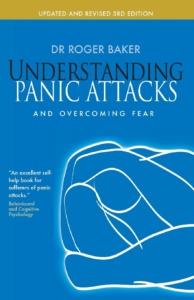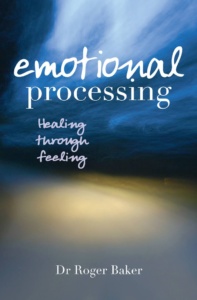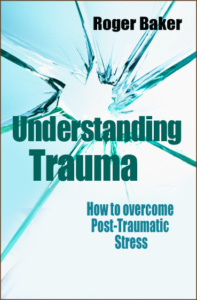Understanding Panic Attacks
What is a panic attack? What does it feel like? What causes attacks? Can they be cured? The authoritative yet practical book helps the reader toward an in-depth understanding of panic. It is essential reading for sufferers, their friends and family, and clinicians. In clear and concise language, it describes a psychological self-help programme for panic sufferers that has been tried and tested over many years. Now in its third edition, this book has been updated throughout to reflect recent research, including the latest developments in cognitive behavioural therapy and new techniques for managing anxiety. “A full recover is possible,” Dr Baker explains. “It certainly is not easy, nor quick, but it definitely is possible.”
Top Customer Reviews
By Bee90 on 5 Nov. 2011
Format: Paperback
Like nearly every other sufferer, panic struck and I had no clue why. I am 21, was about to return for my final year at university after a long summer off and was generally feeling good about my life. Good family, good friends, everything was fine. I was however already on the drug prozac, which I blamed for masked happiness. The drug also had side effects of anxiety and in rare cases, panic attacks. I developed a fear of medication, or any thing that would mess with my already messed up brain. Im sure other panic sufferers will understand what I mean when I say that you want to be in the most normal state of mind when it strikes. I was terrified to even go out drinking with my friends. I stopped drinking coffee, I stopped everything that made me happy. I felt so trapped because I wanted to deal with it naturally, but at the same time the effects were so utterly horrible I just wanted it to go away. Panic physically drains your life and your mind, and the doom that overtakes all happiness you ever had is just so unfair. I didn’t want to let anyone down and knowing I had to deal with this before university started again was added pressure. I was lucky enough to have an extremely supportive Dad who had beaten panic attacks and as much as I tried to listen to his words, and although they helped, I needed more. This book is amazing. I read it in two days because I just could not put it down. I thought the mention or thought of panic would inevitably spark one but that is not true. I truely believe that if you know every in and out of what is actually happening to your body when a panic attack occurs, you are half way there. This book gives you every possible understanding you could ever need.Read more ›
Comment 25 people found this helpful. Was this review helpful to you? Yes No Sending feedback…
Thank you for your feedback.
Sorry, we failed to record your vote. Please try again
5.0 out of 5 starsThis book works!
By A Customer on 27 Mar. 2005
Format: Paperback
My doctor told me to read this book as i was suffering from frequent panic attacks. It really did help me as it explains that these attacks are not going to harm you and that they are just an exaggerated body reaction. I soon was able to relax when i felt an attack coming on and to just ride it out. I am now free of them and am able to lead a normal life.
Comment 11 people found this helpful. Was this review helpful to you? Yes No Sending feedback…
Thank you for your feedback.
Sorry, we failed to record your vote. Please try again
5.0 out of 5 starsUnderstanding Panic attacks & overcoming fear
By A Customer on 5 Aug. 2002
Format: Paperback
I had suffered with panic attacks for 6 months and I thought i was going mad, But with the help of this book it helped me learn to understand what was happening to me and helped me to start overcoming the fear of going out the house. Even now in a bad patch i still refer to the book and would recommend this book to any one who wants to understand and start to overcome panic attacks
Comment 10 people found this helpful. Was this review helpful to you? Yes No Sending feedback…
Thank you for your feedback.
Sorry, we failed to record your vote. Please try again
5.0 out of 5 starsunderstanding and overcoming
By J. DOUGLASVINE VOICE on 2 Jun. 2011
Format: Paperback
Agrophobia and fear render so many prisoners in their own personhood. This 3rd edition rework is a concise and accessible guide with proven helps for all kinds of readers. Cognitive therapy, anxiety management techniques and pastoral care is well addressed in this very needful title. The myths about and root causes of panic attacks were particularly potent and with all else reflect the pooled wisdom of more than thirty years of professional practice. The author has extensive experiences in serving patients with panic attacks and there are both medical and psychological explanation in the book. All symptoms of panic attacks are described explicitly. Possibility and hope permeate this writing. Unique, valued and redemptive!
Comment 6 people found this helpful. Was this review helpful to you? Yes No Sending feedback…
Thank you for your feedback.
Sorry, we failed to record your vote. Please try again
5.0 out of 5 starsWish I’d had this book 10 years earlier!
By L. Hamilton on 24 April 2011
Format: Paperback
It took 10 years of suffering from (more than daily) panic attacks for a family friend to find out what was happening to me and give me this book (which she had used herself). By this time I was close to totally agoraphobic. Boy did reading this book turn my life around. GPs had tried all sorts of meds but there wasn’t the understanding of panic attacks back then that there is now, and Roger Baker is the man to thank for how things have changed. If anyone ever told me that a book was all I needed I would have laughed in their face, but reading this book and understanding every aspect of my body’s behaviour and how it was supposed to help me (in an entirely different situation) was enough for me to get back to full health. I’m not saying it’s easy, doing CBT on yourself never is, and I would always advise having a good friend or two to back you up, but it works. If you suffer from panic attacks buy this book. I have now handed out 7 copies of this book (my own copy which I then replace) and now I have learned to keep a couple spare. Nipping panic attacks in the bud is key to not losing 10 years of your life (as I did) and if I had enough money to buy a copy for every sufferer I would, rather than have them go deep into the world of panic attacks.
2 Comments 16 people found this helpful. Was this review helpful to you? Yes No Sending feedback…
Thank you for your feedback.
Sorry, we failed to record your vote. Please try again
Understanding Emotional Processing
A new way of handling emotional pain and hurts. Based on ground breaking psychological research. ‘It’s as if the body has a second immune system, an emotional system, devoted not to physical protection, but to protection from emotional hurt and trauma.’ Dr Roger Baker. Is there a way of harnessing our emotions, of living in harmony with them and finding meaning and fulfilment through them? In Emotional Processing, Dr Roger Baker offers a new psychological approach. Basing his writing on twenty years of experience in therapy and the groundbreaking research he has undertaken with his research team, he explains how emotional processing works. He begins by examining the meaning and purpose of emotions, affirming the crucially important role they play in a full and healthy life. They are, he says, an advanced information system, not an opponent of rational thought. He then goes on to show how we have a sort of second immune system, able to absorb and break down emotional hurts and stress just as our first immune system deals with viruses and bacteria. When we move with this system of emotional processing, instead of blocking or hindering it, life’s troubles and traumas can be so much more easily absorbed. Illustrated throughout with examples from patients in psychological therapy and from everyday life, Emotional Processing offers all of us new and important insights into the path to emotional well-being.
Book reviews
Emotional Processing: Healing Through Feeling Roger Baker
Feelings and emotions are at last being brought effectively into mainstream psychological theorising and research. Roger Baker, a UK consultant clinical psychologist/researcher, describes a new theory of emotion, therapy and assessment – the Emotional Processing Scale.
Vignettes enable the reader to identify gently with the limiting experiences of panic, phobias, alcoholism and post-trauma, A natural ‘immunising protection’ against emotions that may be difficult to process is identified as taking place by three main routes: negative emotional schemas from childhood,somatisation (replacement by physical symptoms) or rumination Sufferers may be aware only of being stuck, or of a troublesome experience. Patient professional questioning focused on discovering underlying emotion and its context can lead to a degree of re-experiencing, catharsis, and a more constructive life for the sufferer, This approach offers an alternative to cognitive trends in brief therapy today.
Emotion embedded in autism, also in the experience of physical illness and borderline conditions (e.g. obsessional behaviour), is touched on briefly, with exciting clinical prospects. An accessible popular book, with non-technical language, well-referenced for professional readers – this could usefully be placed in clinical psychology and GP waiting rooms, and shared with non-psychologists, to engage with this long-neglected topic.
Lion Hudson; 2007; Pb £7.99 Reviewed by Erica Brostoff
Understanding Trauma
In this book Dr Roger Baker explains the many symptoms of Post Traumatic Stress. Based on twenty years of research and clinical practice, he lays out a self-help programme – Emotional Processing Therapy – which can defuse the distressing memories of trauma and reduce the occurrence of flashbacks, nightmares, and tension. But it is not just a treatment program: for the first time Dr Baker shows what can be done to prevent Post Traumatic Stress. “Knowing how to face trauma,” Dr Baker proposes, “and minimize its worst ravages is a skill that we can all benefit from.” Full of first-hand experiences and stories of patients’ progress in therapy, this is essential reading for trauma sufferers, their family and friends, and specialists alike.


